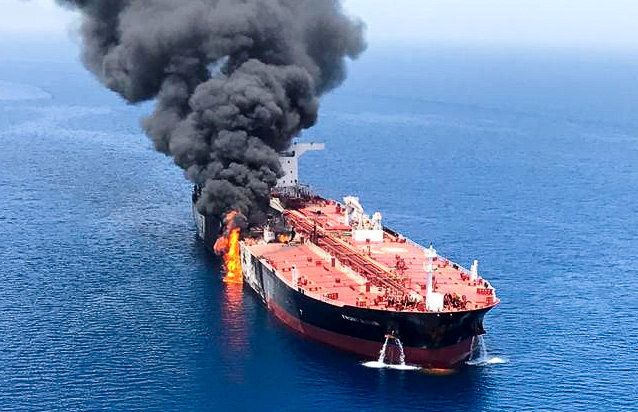June 14, 2019
More trouble brewing in the Strait of Hormuz —Two oil tankers were attacked in the Gulf of Oman yesterday, and their crews had to be rescued by Iranian and US naval vessels. This follows attacks on four tankers off the coast of the United Arab Emirates last month. Washington blames Iran, but Tehran — which earlier this week issued vague threats against the US — says the timing is "suspicious." After all, one of the tankers attacked Thursday was Japanese-owned — would Iran hit the vessel right as Japan's prime minister was in Iran on a mission to ease US-Iran tensions? We're watching to see if the temperature rises further between Washington (and its Gulf Arab allies) and Tehran, but we're also watching the gas pump: 20% of the world's traded oil passes through the Strait of Hormuz every day.
Boris Johnson — Former UK foreign secretary Boris Johnson on Thursday topped the first official ballot of Tory MPs in the race to succeed outgoing Prime Minister Theresa May. Boris received 114 votes and more than twice as many as the next-closest contender in a crowded field. The results make him a virtual shoe-in to become the next PM in a final vote by 124,000 rank-and-file Conservative party members later this month. Less certain is whether the former London mayor and media personality, whose late-breaking support for Brexit may have played a role in the UK's vote to leave the EU in 2016, can do any better than May in securing a Brexit deal that's acceptable to Parliament.
Protests in Haiti — The Caribbean Island nation has been paralyzed for days by fresh protests demanding the resignation of President Jovenel Moise, whom a government audit has implicated in the misappropriation of millions dollars earmarked for poverty alleviation. But wait… the plot thickens: the money was part of a Venezuelan regional development program in which Caracas allowed Caribbean nations to defer payments on Venezuelan oil imports so they could free up more cash for economic development. Haiti is one of the Western hemisphere's poorest countries. Moise says he has done nothing wrong and that he will be vindicated by a further investigation: we are watching to see if the streets believe him.
What We Are Ignoring
AMLO, Used Plane Salesman — Mexico's President Andres Manuel Lopez Obrador announced this week he will sell the luxurious presidential plane he inherited from his predecessor, and direct the cash towards plans to reduce the flow of US-bound migrants that pass through his country. We certainly can't deny that it's a cool plane: a sumptuously appointed Boeing 787 Dreamliner that AMLO says he can get $150 million for. But it'll take a lot more than that to address the problem of desperate Central Americans trying to reach the US border. What's more, AMLO had alreadypromised to sell this plane to help poor people in Mexico. As "man of the people" gestures go, this one sends some oddly mixed messages.
More For You
A photograph posted by U.S. President Donald Trump on his Truth Social account shows him sitting next to CIA Director John Ratcliffe as they watch the U.S. military operation in Venezuela from Trump's Mar a Lago resort, in Palm Beach, Florida, U.S., January 3, 2026.
@realDonaldTrump/Handout via REUTERS
Most Popular
- YouTube
In this "ask ian," Ian Bremmer analyzes Trump’s recent meeting with Zelensky and how close (or far) Russia and Ukraine are from a peace deal.
Syrian President Ahmed al-Sharaa attends the military parade of the Syrian army in Umayyad Square in central Damascus to mark the one-year anniversary of the fall of the Assad regime, on Dec. 8, 2025.
Mohammed Al-Rifai/dpa via Reuters Connect
A year ago this month, Syria’s brutal dictatorship collapsed. There are signs of recovery, but sectarian violence threatens to undermine the optimism.
© 2025 GZERO Media. All Rights Reserved | A Eurasia Group media company.
